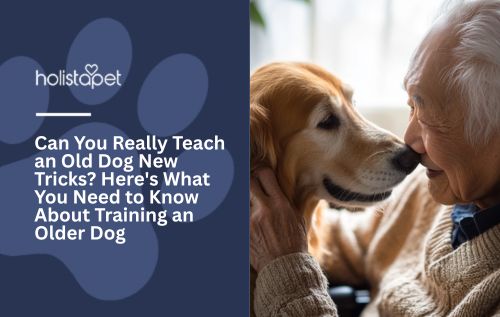If you’ve ever wondered whether your senior pup can still learn new skills, the answer is a resounding yes! While it’s true that puppies tend to learn faster, training an older dog is not only possible—it can be incredibly rewarding for both of you.
In fact, older dogs often come with advantages: they’re usually calmer, less distracted, and may already know some basic commands. Whether you're working on house manners, leash walking, or even fun new tricks, there are plenty of ways to successfully train an older dog.

Why Train an Older Dog?
Training isn't just for puppies—it’s a lifelong part of a healthy relationship between dogs and their humans. Here are a few reasons to keep training going in your dog’s golden years:
-
Mental stimulation: Keeps their minds sharp and helps prevent cognitive decline.
-
Improved behavior: Address bad habits that may have gone unchecked.
-
Stronger bond: Training is quality time that deepens trust and communication.
-
Better adaptability: Older dogs may face new environments or family dynamics—training helps them adjust.
Tips for Successfully Training an Older Dog
-
Be Patient, Go Slow
Older dogs may need a little more time to process new information. Keep sessions short, positive, and consistent. -
Use Positive Reinforcement
Reward-based methods (like treats, praise, or play) work best. Avoid punishment—it can cause confusion or fear. -
Consider Health Limitations
Arthritis or hearing loss may affect your dog's ability to perform certain tasks. Always check with your vet before starting a new training routine. -
Stick to a Routine
Older dogs thrive on consistency. Train at the same time each day and in familiar surroundings when possible. -
Work on Practical Skills
Reinforce commands like “stay,” “come,” or “leave it.” You can also teach helpful new cues like “step up” or “slow” to accommodate aging bodies.

Frequently Asked Questions
Q: Is it harder to train an older dog than a puppy?
A: Not necessarily. While puppies may learn faster, older dogs are often more focused and less distracted. Success just takes patience and the right approach.
Q: What are the best treats for training an older dog?
A: Soft, low-calorie treats are ideal—older dogs may have dental issues or be prone to weight gain.
Q: How often should I train my senior dog?
A: Aim for short, consistent sessions 5–10 minutes a day. Keep it fun and end on a positive note.
Q: Can senior dogs still learn tricks or new commands?
A: Absolutely! Age is not a barrier to learning. Many older dogs enjoy the mental challenge and the attention they get from training.
Q: What if my dog has never been trained before?
A: It’s never too late. Start with basic cues and be patient—older dogs can catch on quickly when training is positive and consistent.
Final Thoughts

Training an older dog may take a little more time and consideration, but it’s entirely achievable—and incredibly worthwhile. Whether you’re reinforcing basic commands or introducing new ones, the process strengthens your bond and improves your dog’s quality of life.
Remember: just because your dog has a few grey hairs doesn’t mean they’re done learning. With love, consistency, and a few tasty treats, your senior companion can thrive.







![Probiotics For Dogs [Soft Chews] - HolistaPet](http://www.holistapet.com/cdn/shop/files/Probiotic-Infographic-1_472d7a29-e30c-435a-9638-1365d8c3a9f9.jpg?v=1725384841&width=104)



























Leave a comment
This site is protected by hCaptcha and the hCaptcha Privacy Policy and Terms of Service apply.